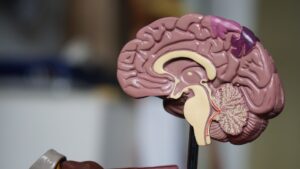 As you get older, it is not uncommon to occasionally forget where you put something, lose your train of thought, or forget a name, but if you have persistent memory problems that disrupt your daily life it might be a sign of something more serious. You may be experiencing early signs of dementia.
As you get older, it is not uncommon to occasionally forget where you put something, lose your train of thought, or forget a name, but if you have persistent memory problems that disrupt your daily life it might be a sign of something more serious. You may be experiencing early signs of dementia.
Dementia is an umbrella term used to describe a collection of symptoms resulting from damage to the brain that leads to deterioration of cognitive function and that impacts your ability to remember things and process information. Symptoms may vary according to the part of the brain that has been affected, and usually appear sometime before a diagnosis of dementia is made.
According to the World Health Organization (2022), fifty-five million people worldwide have dementia and more than ten million new cases are diagnosed every year.
What is early onset dementia?
Early onset dementia, also known as young onset dementia, is an uncommon form of dementia that strikes people under the age of 65. Common causes are Alzheimer’s disease, front temporal lobar degeneration, traumatic brain injury, or alcohol-related cognitive disorders.
At first, symptoms are so mild that they are not immediately obvious or considered cause for concern. Unlike late-onset dementia, they may not include memory loss, which makes dementia even harder to recognize.
The afflicted person may be reluctant to accept that anything is wrong and put off visiting the doctor. When he or she does go, his or her symptoms are often misdiagnosed and attributed to too much stress, sleep deprivation, depression, or an overbooked schedule. This misdiagnosis causes significant delays in receiving appropriate, timely treatment, which could improve his or her quality of life.
Early warning signs of dementia.
If you have two or more of the following signs, don’t ignore them. Schedule an appointment with your healthcare provider to rule out any treatable conditions that can cause dementia-like symptoms. The earlier dementia is detected, the better the treatment options and the more effective they can be in slowing its progression down.
 Loss of short-term memory. There’s a change in your ability to retain new information you learn; or remember the specific details of recent conversations, events, or something you just read. You struggle to recall what you did yesterday or had for breakfast today.
Loss of short-term memory. There’s a change in your ability to retain new information you learn; or remember the specific details of recent conversations, events, or something you just read. You struggle to recall what you did yesterday or had for breakfast today.
Forgetfulness. You regularly misplace items and are unable to retrace your steps to find them, lose your train of thought, and forget familiar names and faces. You have trouble remembering things like why you entered a room or picked something up, what you were supposed to do, or where you were going.
Repeating yourself. You ask the same question or repeat the same story over and over again. You also tend to lose track of time and forget why or when you did something like take your meds or shower or eat a meal, so you do it over again.
Confusion. Your reasoning is faulty, and you may do illogical things such as put everyday items in unusual places – your purse in the refrigerator, for example – or try to open your apartment door with a car key. It is increasingly difficult for you to organize your thoughts, learn new things, and/or cope with unfamiliar situations.
Failing sense of direction and spatial orientation. You may forget how to get to familiar places or be unable to recognize where you are, how you got there, or why. You routinely forget what day or date it is, and get disoriented when walking or driving – even in your neighborhood.
You may also have trouble calculating distances between objects, have impaired depth perception, have balance issues that lead to stumbling or falling, and trouble navigating spaces such as in parking.
Poor judgment. You may feel overwhelmed by everyday decision-making, lose the ability to think clearly or make sound judgments, and make poor financial choices.
 Difficulty with abstract thinking. You have trouble with things that involve abstract thinking such as solving problems and simple math skills and may find it increasingly difficult to do things like count your change at the sore checkout counter, balance your checkbook, or keep track of your bills.
Difficulty with abstract thinking. You have trouble with things that involve abstract thinking such as solving problems and simple math skills and may find it increasingly difficult to do things like count your change at the sore checkout counter, balance your checkbook, or keep track of your bills.
Difficulty performing familiar tasks. You may find it hard to stay focused on what you are doing and take longer to do your tasks or have trouble finishing them. You may also find it increasingly difficult to do things like plan a meal or follow a recipe while cooking.
Communication problems. You may experience a loss of vocabulary, struggle to find the right word for something or use the wrong word, and have a hard time expressing your thoughts. You may also have trouble following conversations.
Changes in personality and disposition. You may withdraw from friends and family, lose interest in activities you used to enjoy, and neglect self-care such as bathing, changing your clothes, or keeping a clean home.
Treatable conditions that can cause dementia-like symptoms.
- Alcohol or drug use.
- Drinking alcohol with certain medications.
- Exhaustion.
- Sleep deprivation.
- Stress.
- Depression.
- Emotional distress.
- Nutritional deficiencies.
- Vitamin deficiencies.
- Hormone imbalance.
- Metabolic disorders such as hypoglycemia or thyroid problems.
- Dehydration.
- Head injuries.
- Strokes.
- Side effects of medications.
- Kidney, liver, heart, or lung problems.
- Urinary tract and chest infections.
- Poor vision.
- Hearing impairment.
- Tumors.
Lifestyle changes and coping tips that can slow early onset dementia symptoms.
- Regular daily aerobic exercise such as walking or dancing.

- Staying mentally and socially active by engaging in different activities with others.
- Eating a healthy diet rich in fruits and vegetables, and staying well hydrated.
- Avoiding alcohol or drug abuse.
- Avoiding smoking.
- Getting enough sleep.
- Challenging your mind with cognitively stimulating activities such as board games, computer games, and puzzles.
- Joining a support group for people with early-onset dementia.
- Keeping a to-do list, as well as a calendar on which you write down appointments, dates of important events, and due dates for bills.
- Programming frequently used phone numbers into your speed dial.
- Keeping bills and other important papers visible that need to be taken care of.
- Keeping your meds organized in a pillbox with separate compartments to make it easier to remember when to take them and avoid confusion as to whether you have done so or not.
Benefits of counseling.
Most people with early-onset dementia develop symptoms between the ages of thirty and sixty. Because of their young age, they may still be working, have dependent children at home, and have significant family, career, and financial commitments and responsibilities. This creates a unique set of challenges that are likely to be quite different from those faced by older people suffering from late-onset dementia.
Being cut down in their prime wage-earning years, when they are still physically fit and active, may make it much harder for them to accept the diagnosis and the changes it will bring to their and their family’s plans for the future.
They may feel powerless, frustrated, depressed, and filled with anxiety over how they will manage to provide financially for their family, care for their children, and how it will impact their relationship with their spouse.
Counseling provides a safe space where you can process your feelings and fears with a trained mental health professional. He or she will help you work toward accepting the diagnosis and adapting to the coming changes, as well as help give your self-esteem and confidence a boost by highlighting your current strengths and assets and turning your focus to the here and now.
If you would like to set up an appointment to meet with one of the faith-based counselors in our online directory, please give us a call. You do not have to walk this path alone. We would be honored to walk alongside you and provide the support you need on this journey.
References:
Andrew E. Budson, MD. “I’m too young to have Alzheimer’s disease or dementia, right?” Harvard Health Publishing, Harvard Medical School. June 20, 2022. health.harvard.edu/blog/im-too-young-to-have-alzheimers-disease-or-dementia-right-202206202764.
“Dementia.” World Health Organization. September 20, 2022. who.int/news-room/fact-sheets/detail/dementia.
“Dementia Indicators In Younger Adults.” Dementia.org. February 3, 2014. dementia.org/challenges-of-younger-onset-dementia.
Mayo Clinic Staff. “Dementia.” Mayo Clinic. mayoclinic.org/diseases-conditions/dementia/symptoms-causes/syc-20352013.
Valencia Higuera. “11 Early Signs of Dementia.” Healthline. Updated February 6, 2023. healthline.com/health/dementia/early-warning-signs.
“What is young onset dementia?” Dementia UK. dementiauk.org/about-dementia/young-onset-dementia/what-is-young-onset-dementia/,
Photos:
“Brain Model”, Courtesy of Robina Weermeijer, Unsplash.com, CC0 License; “Question Marks”, Courtesy of Rodion Kutsaiev, Unsplash.com, CC0 License; “Remembering Grandma”, Courtesy of Tim Doerfler, Unsplash.com, CC0 License; “Exercise”, Courtesy of Anupam Mahapatra, Unsplash.com, CC0 License






